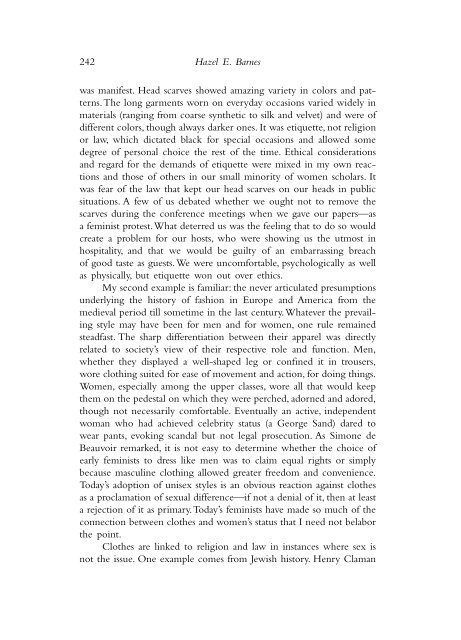Create successful ePaper yourself
Turn your PDF publications into a flip-book with our unique Google optimized e-Paper software.
242 Hazel E. Barnes<br />
was manifest. Head scarves showed amazing variety in colors and patterns.<br />
The long garments worn on everyday occasions varied widely in<br />
materials (ranging from coarse syn<strong>the</strong>tic to silk and velvet) and were <strong>of</strong><br />
different colors, though always darker ones. It was etiquette, not religion<br />
or law, which dictated black for special occasions and allowed some<br />
degree <strong>of</strong> personal choice <strong>the</strong> rest <strong>of</strong> <strong>the</strong> time. Ethical considerations<br />
and regard for <strong>the</strong> demands <strong>of</strong> etiquette were mixed in my own reactions<br />
and those <strong>of</strong> o<strong>the</strong>rs in our small minority <strong>of</strong> women scholars. It<br />
was fear <strong>of</strong> <strong>the</strong> law that kept our head scarves on our heads in public<br />
situations. A few <strong>of</strong> us debated whe<strong>the</strong>r we ought not to remove <strong>the</strong><br />
scarves during <strong>the</strong> conference meetings when we gave our papers—as<br />
a feminist protest. What deterred us was <strong>the</strong> feeling that to do so would<br />
create a problem for our hosts, who were showing us <strong>the</strong> utmost in<br />
hospitality, and that we would be guilty <strong>of</strong> an embarrassing breach<br />
<strong>of</strong> good taste as guests. We were uncomfortable, psychologically as well<br />
as physically, but etiquette won out over ethics.<br />
My second example is familiar: <strong>the</strong> never articulated presumptions<br />
underlying <strong>the</strong> history <strong>of</strong> fashion in Europe and America from <strong>the</strong><br />
medieval period till sometime in <strong>the</strong> last century. Whatever <strong>the</strong> prevailing<br />
style may have been for men and for women, one rule remained<br />
steadfast. The sharp differentiation between <strong>the</strong>ir apparel was directly<br />
related to society’s view <strong>of</strong> <strong>the</strong>ir respective role and function. Men,<br />
whe<strong>the</strong>r <strong>the</strong>y displayed a well-shaped leg or confined it in trousers,<br />
wore clothing suited for ease <strong>of</strong> movement and action, for doing things.<br />
Women, especially among <strong>the</strong> upper classes, wore all that would keep<br />
<strong>the</strong>m on <strong>the</strong> pedestal on which <strong>the</strong>y were perched, adorned and adored,<br />
though not necessarily comfortable. Eventually an active, independent<br />
woman who had achieved celebrity status (a George Sand) dared to<br />
wear pants, evoking scandal but not legal prosecution. As Simone de<br />
Beauvoir remarked, it is not easy to determine whe<strong>the</strong>r <strong>the</strong> choice <strong>of</strong><br />
early feminists to dress like men was to claim equal rights or simply<br />
because masculine clothing allowed greater freedom and convenience.<br />
Today’s adoption <strong>of</strong> unisex styles is an obvious reaction against clo<strong>the</strong>s<br />
as a proclamation <strong>of</strong> sexual difference—if not a denial <strong>of</strong> it, <strong>the</strong>n at least<br />
a rejection <strong>of</strong> it as primary. Today’s feminists have made so much <strong>of</strong> <strong>the</strong><br />
connection between clo<strong>the</strong>s and women’s status that I need not belabor<br />
<strong>the</strong> point.<br />
Clo<strong>the</strong>s are linked to religion and law in instances where sex is<br />
not <strong>the</strong> issue. One example comes from Jewish history. Henry Claman
















